15 Best AI Security Tools in 2026 to Protect GenAI, LLMs & AI Agents
Explore the top AI security tools for 2026, comparing coverage across AI models, model risk, governance, and enterprise-grade protection.

Kruti
Sep 16, 2025
Its 2026, and cyber attackers are not just working harder, they are working faster, more automated and way more intelligent. They are utilizing new age technologies like AI agents, machine learning, automation to relentlessly identify weak spots across several endpoints, AI and cloud workflows and software supply chain. If security teams still keep relying on old age security methods to curb modern threats it will prove to be extremely risky. Hence, AI cyber security tools have turned from a great addition to essential requirement as businesses adopt LLMs, and AI agents across SaaS and cloud environments.
In this blog we will explore why AI cybersecurity tools are matter and what are the Top AI Security tools for 2026.
What are AI Security Tools?
AI Security tools utilize machine learning to identify and prevent malware and ransomware. They thoroughly analyze system behavior, network traffic and other activities to detect threats in real-time to ensure strong security for your security endpoints.
Why are AI Cyber Security Tools Important?
Artificial Intelligence security tools offer significant benefits which makes them key driver in modern cybersecurity process. Here’s why it is important.
AI security helps identify large sets of data in real-time and can sift through logs.
It can identify threats and respond to incidents instantly.
They have adaptive defense mechanism which allows them to learn new information with threat intelligence and they can do this with environmental change in attack patterns.
AI Security tools can consolidate data from several endpoints, identities, cloud workloads and network in a single view.
These tools offer context on why it reached a specific conclusion or has flagged a risk which helps security professionals in determining if the tool outcomes are valid.
Important Features that makes AI Security Tools Effective
Choosing the best AI security tool requires checking how many AI models and systems it can cover, how well it can monitor AI behavior, and whether it can grow to support the entire enterprise. Enterprises evaluate AI security platforms by how well they control access, manage model interactions, and detect threats across SaaS and cloud environments. The capabilities below are listed down as to why they are essential.
AI Access and Governance for SaaS
Current SaaS environments now comes with integrated AI agents and features that require visibility and oversight. Tools in this category help organizations understand how users, identities, and data interact with AI across applications. Besides this, they identify integrated AI features, shadow agents, and third-party AI apps across SaaS platforms to uncover data flows and block unapproved AI usage. They also evaluate user behavior to find irregular access patterns, unusual permissions and identity changes that may indicate misuse or unintended data exposure.
LLM Runtime and Prompt Protection
Prompt-based interactions require active monitoring because risks surface at the moment of input and output. These features protect models, users, and data during real-time exchanges. Also, they evaluate prompts and responses to capture prompt injection, unsafe content, hidden instructions, or sensitive information before it is processed. Systems add organizational rules to each interaction, blocking or modifying prompts or outputs that conflict with internal policy or compliance requirements.
Threat Detection and Infrastructure
AI adoption increases the attack surface across cloud, identity, and data systems. They help security teams detect operational risks early and understand how threats move through the environment. It utilizes artificial intelligence to find suspicious activity across workloads, identities, and networks, then highlight the events that needs immediate attention. Furthermore, it tracks how information moves via business platforms and uses AI features to capture unusual access patterns before sensitive data moves from the environment.
Top 15 AI Security Tools in 2026
The below Top 15 best AI security tools are engineered to secure Gen AI applications and LLMs. These platforms offer offensive and defensive capabilities to capture, test and mitigate AI specific threats before they become breaches.
1. Akto
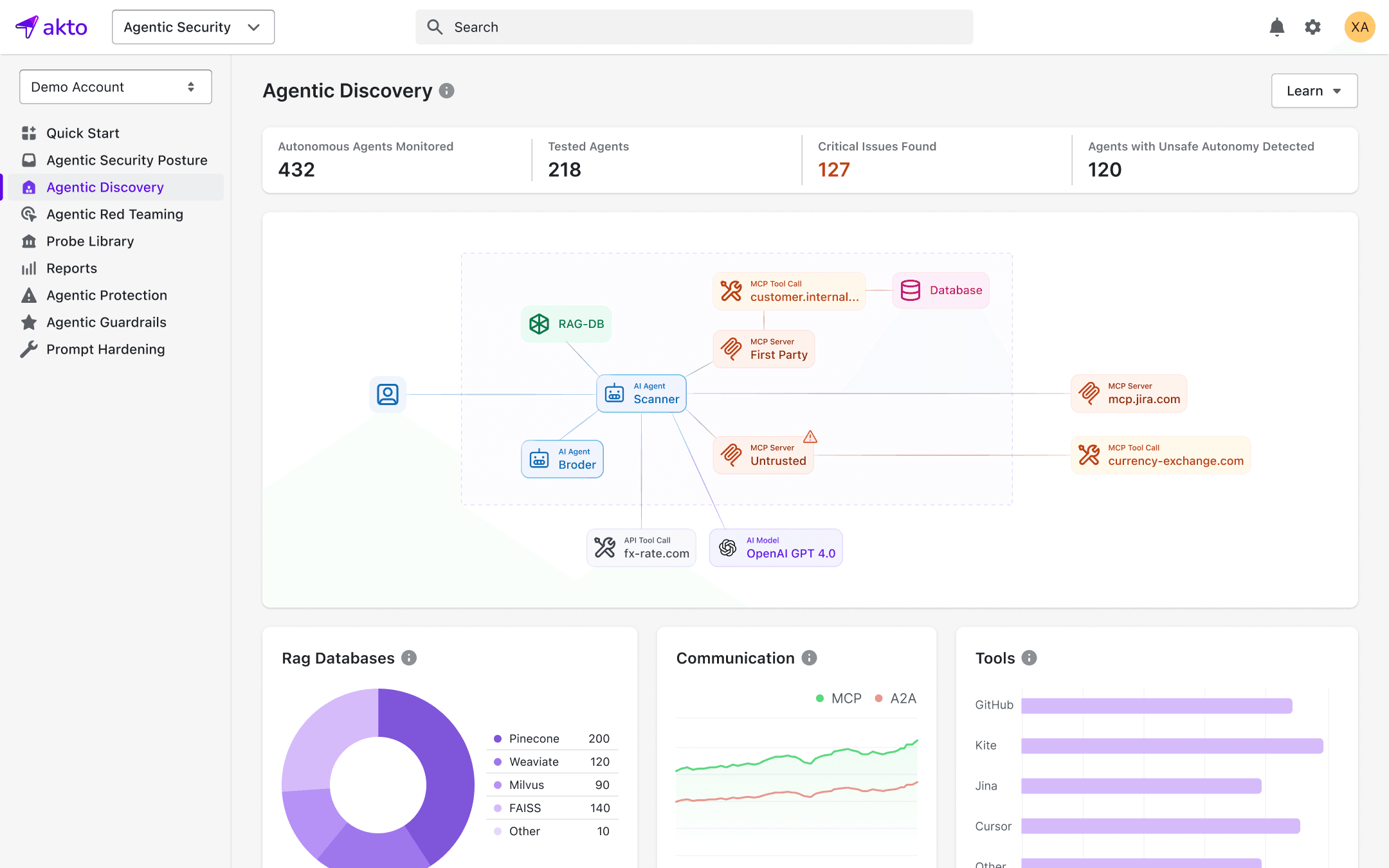
Akto is one of the best AI Security tool which helps enterprises protect AI agents and MCP based workflows across discovery, testing and runtime. It can automatically map AI agents, connected tools and agent tool interactions to offer full visibility inside agentic systems. It continuously runs autonomous red-teaming to capture risks such as prompt injection, line jumping, tool poisoning and unsafe agent behavior. It comes with built-in guardrails, it implements allow or deny controls on prompts, tool calls and outputs. Furthermore, the runtime protection monitors and restricts vulnerabilities and threats in real time.
Best for: Businesses that are deploying MCP, AI agents and autonomous workflows in production that requires deep visibility, continuous red-teaming, runtime guardrails to minimize cybersecurity risks without slowing innovation.
2. Palo Alto Networks
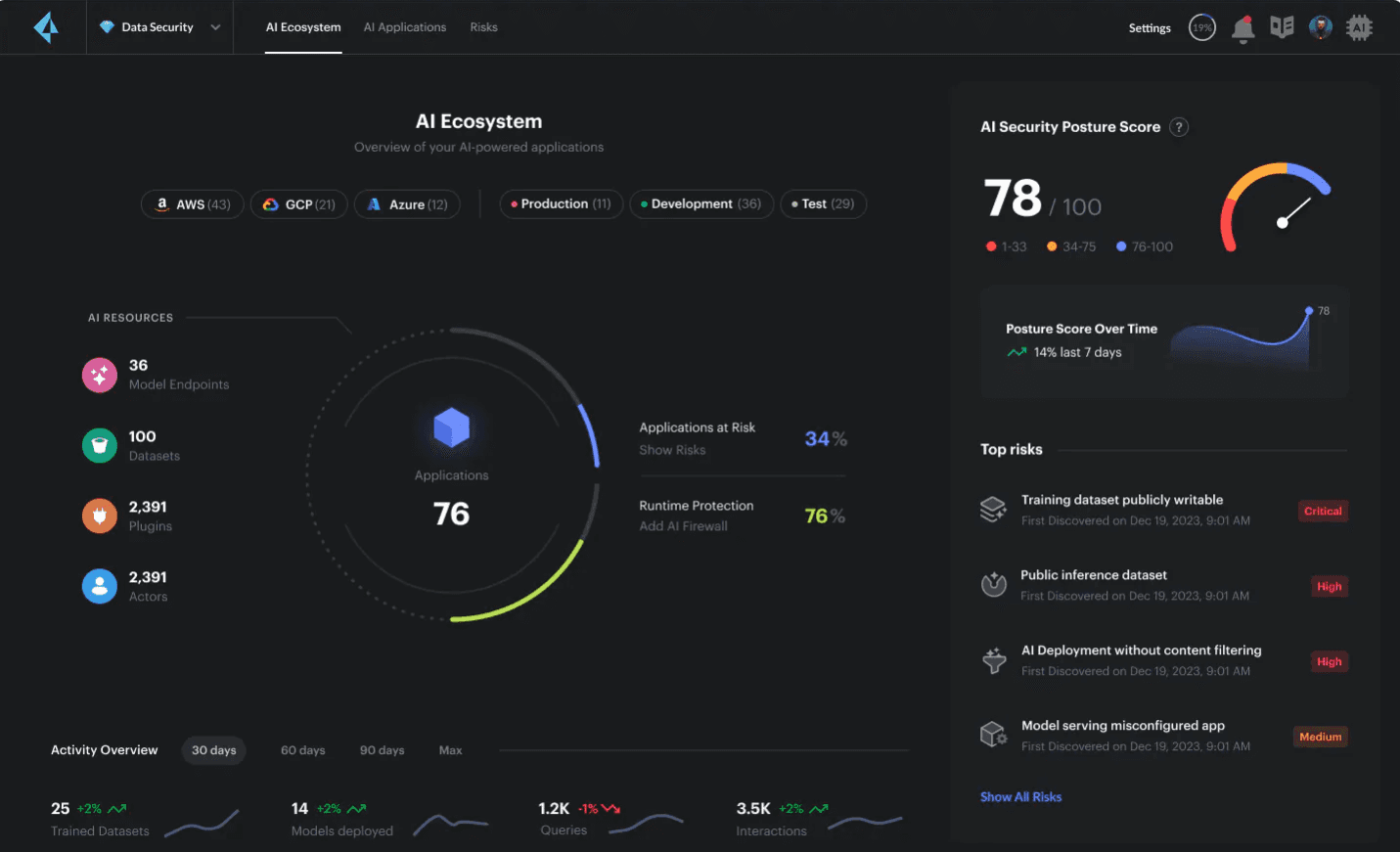
Image Source: Palo Alto
Palo Alto is a comprehensive AI security tool that helps security teams simplify their work using AI and machine learning to automatically detect threats, investigate incidents, and respond quickly. It pulls together data from different sources into one place, making it easier to spot risks, take action faster, and simplify day-to-day security operations.
Best for: Large businesses that run complex SOCs for business having present palo alto network systems.
3. Lasso Security
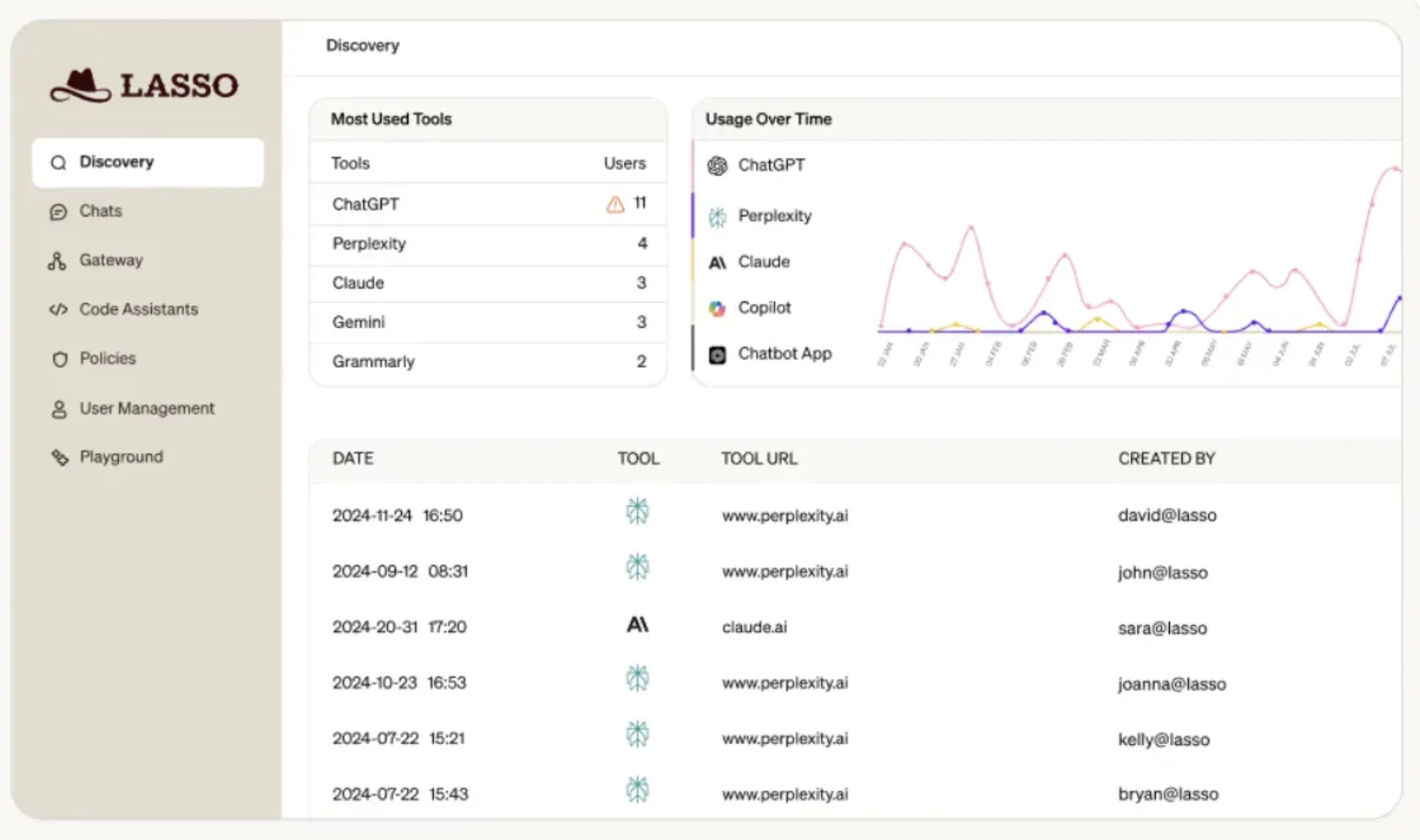
Image Source: Lasso
Lasso Security is a among the top AI Security tools designed to secure enterprise generative AI and LLM usage. Its features include a secured gateway for LLMs, real-time detection, browser and application integrations to track AI usage, logging, masking, or blocking of malicious communication that includes data leaks, prompt injection, or unauthorized data sharing.
Best for: Business organizations that deploy customer-facing generative AI which require data flow control, oversight of AI interactions and compliance across SaaS, cloud, and custom AI applications.
4. Cato Networks (Former AIM Security)
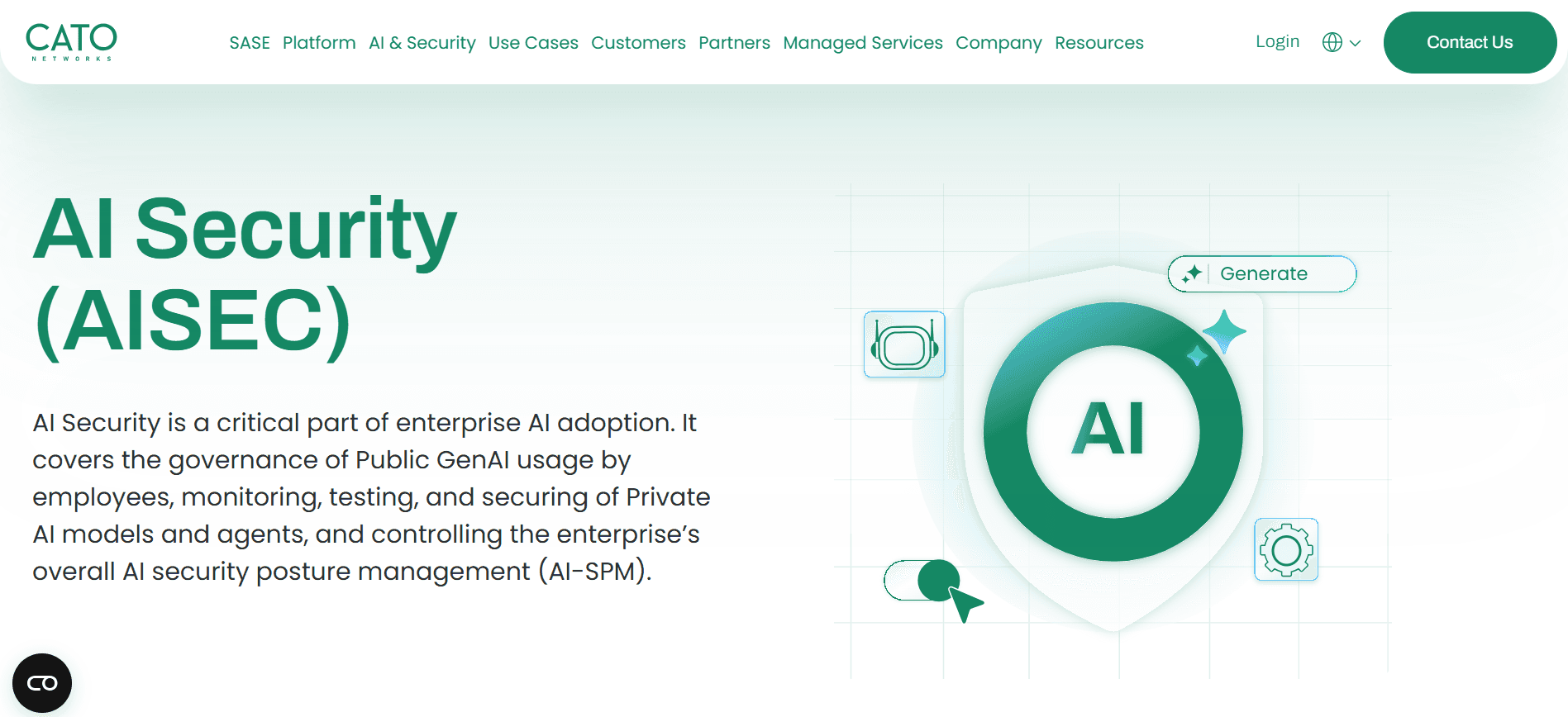
Image Source: Cato Security
Cato Networks Security which was previously called AIM security, delivers a unified AI security platform built for enterprises using generative AI tools. It offers an firewall for runtime protection, AI-Security Posture Management (AI-SPM) to identify, inventory AI assets, and continuous detection of threats like data leakage, prompt injection, or attacks that target AI applications.
Best for: Business organizations that deploy public or private AI tools, looking to build custom AI agents, or those that need full-lifecycle security and compliance across their AI environment.
5. Mindgard
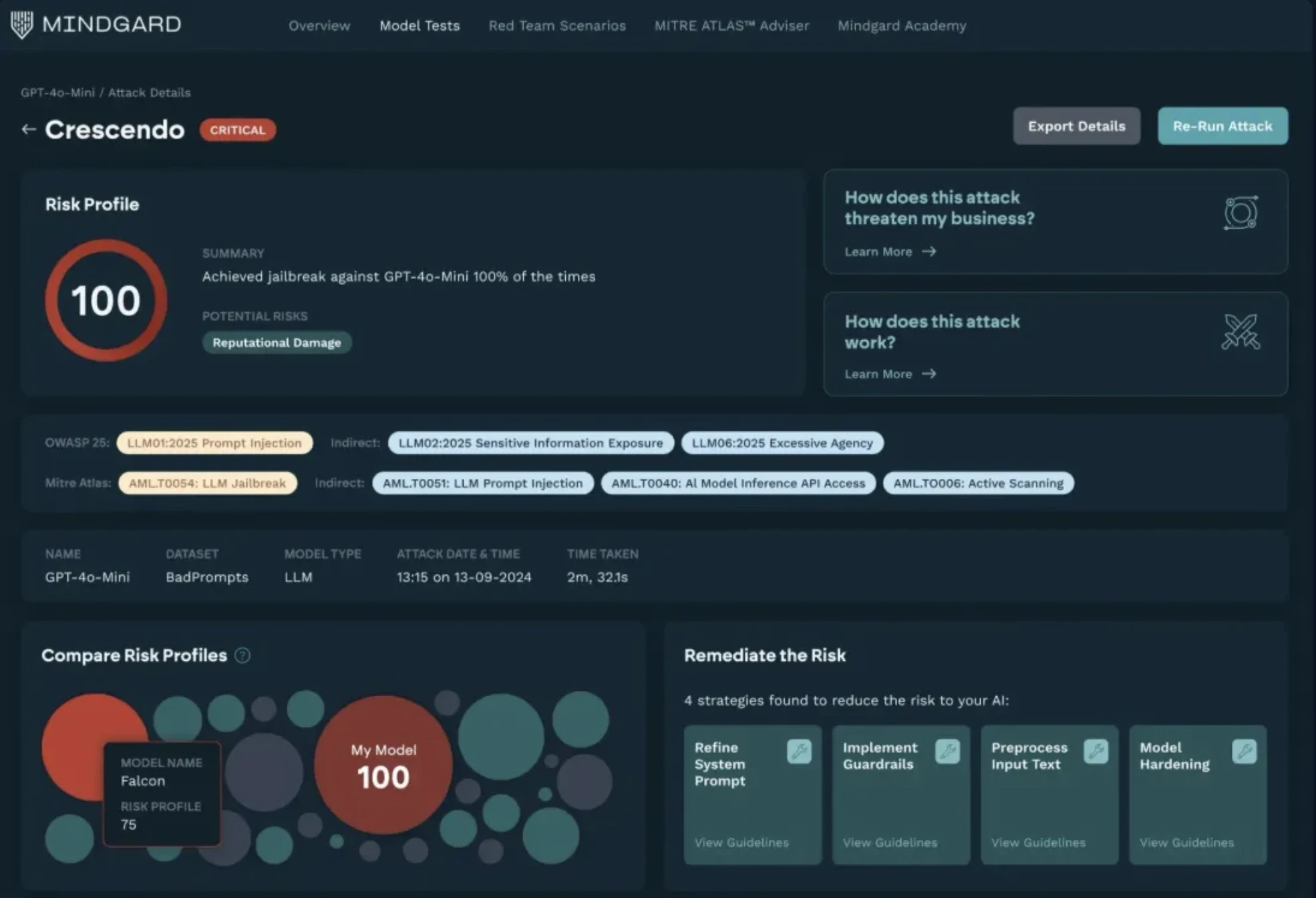
Image Source: Mindgard
Mindgard is one of reliable AI security platform that analyzes and solidifies enterprise AI systems, which includes LLMs, generative models, multimodal architectures, and custom agents. It can perform automated red teaming to find threats such as model inversion, data poisoning, prompt injection, and evasion attempts. Mindgard also embeds with CI/CD pipelines and security operations so teams can evaluate model behavior and address AI-specific risks throughout development and production.
Best for: Businesses building or using AI/LLM applications looking to proactively detect and remediate AI-specific threats before deployment or in production.
6. Lakera LLM Guard
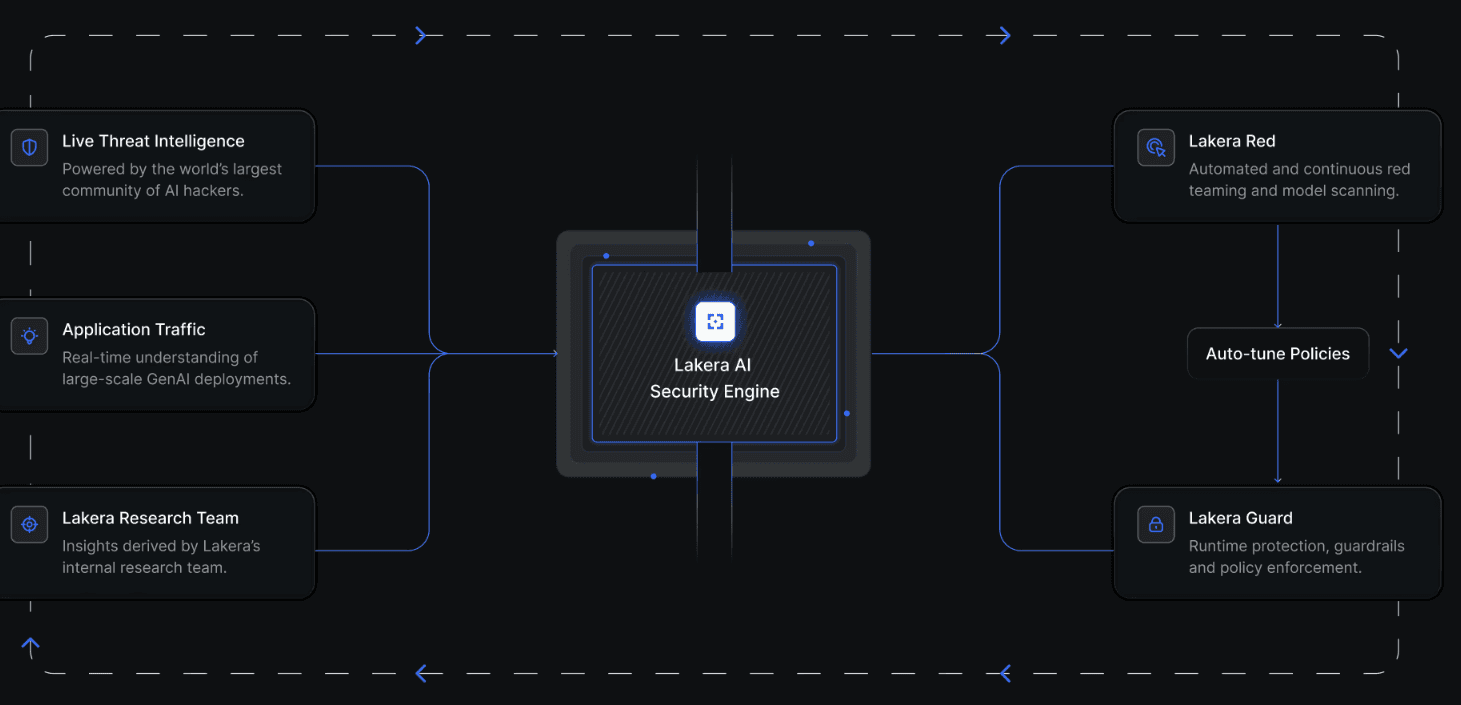
Image Source: Lakera
Lakera Guard is a runtime security and governance tool built to secure generative-AI applications and large language models. It intercepts prompts and model outputs via a single API call, then applies real-time threat detection to block prompt injection, data leakage, malicious content, and harmful outputs before they systems. Its low-latency architecture supports multimodal LLMs and can scale to high-volume deployments.
Best for: Enterprises deploying chatbots, custom AI agents who need real-time compliance controls, guardrails and content– or data-loss protection across all AI interactions.
7. Protect AI

Image Source: Protect AI
Protect AI is a popular security platform that helps enterprises secure pipelines, models and runtime environments. It support model scanning, testing, red teaming, and continuous monitoring for risks like data exposure, prompt injection, and unsafe model behavior. Protect AI also provides tools for managing the security posture of machine learning systems and for capturing issues across the AI supply chain.
Best for: Businesses that require security coverage for the entire AI lifecycle which includes development, evaluation, and production use.
8. Noma Security
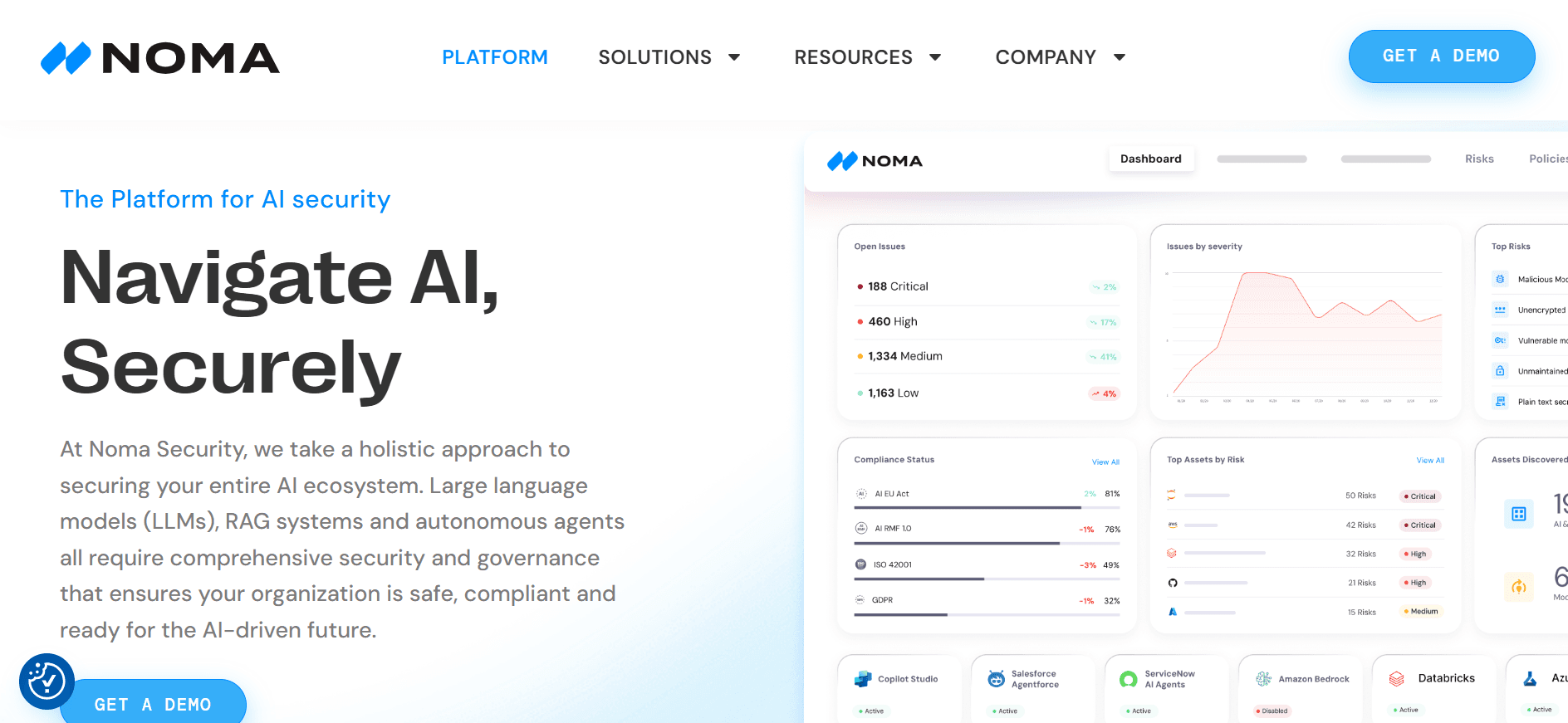
Image Source: Noma AI
Noma Security is one of the best AI security tool that secures AI across models, SaaS applications, LLMs, data pipelines, and autonomous agents. It can discover AI assets across environments, provide AI Security Posture Management, and adds runtime protections that captures prompt injection, model manipulation, and unsafe agent behavior. Noma also supports compliance workflows and continuous monitoring for businesses that adopt Gen AI at scale.
Best for: Companies which needs full visibility into AI assets and runtime protections across the entire AI lifecycle.
9. Radiant Security AI
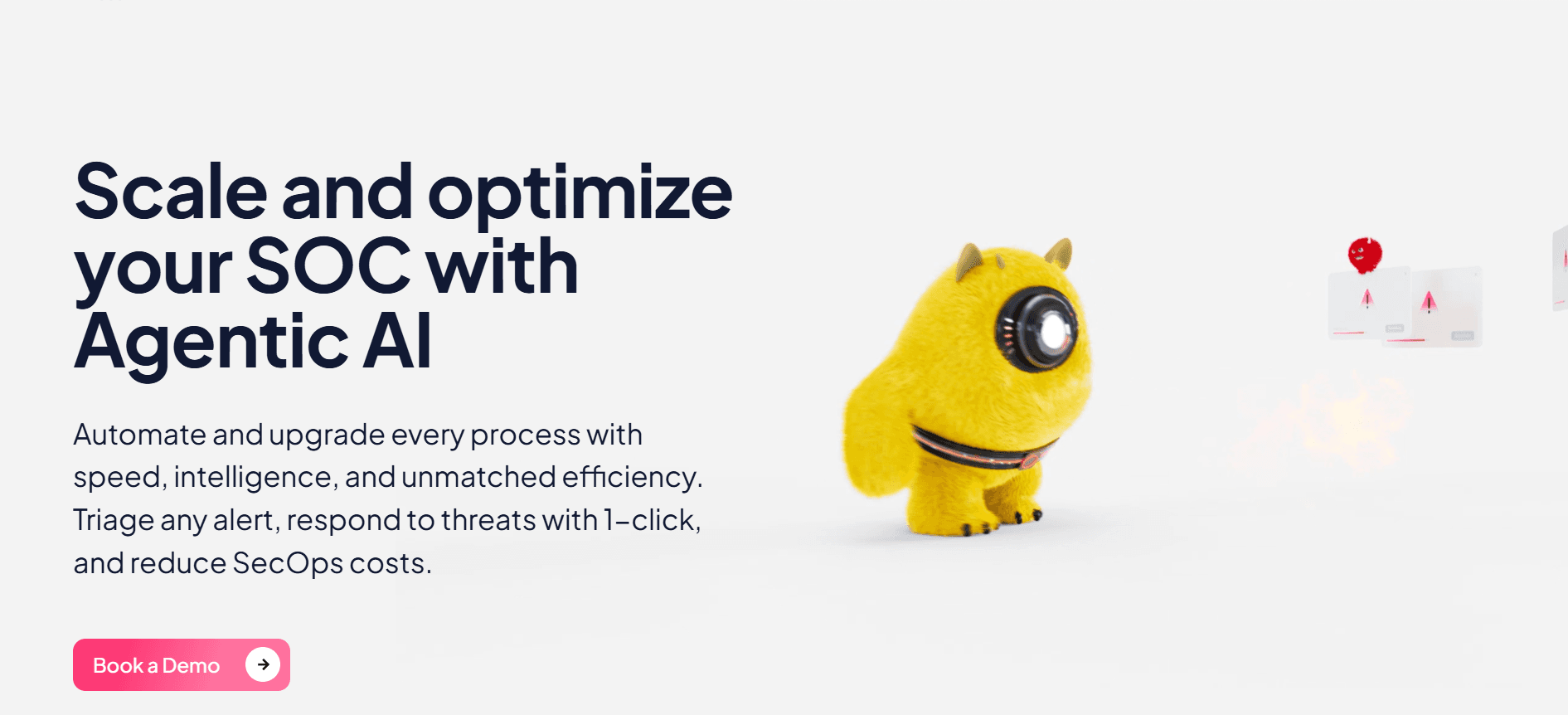
Image Source: Radiant Security AI
Radiant Security is a top AI-powered Security tool that automatically investigates, triages and responds to security alerts from any data source. It makes use of agentic AI to address with human-level reasoning and conducts threat detection across identity, cloud, endpoint and more.
Best for: Security teams that requires modernized security operations, cut alert fatigue, accelerates incident response, and ensure comprehensive coverage across diverse IT and cloud environments.
10. CalypsoAI
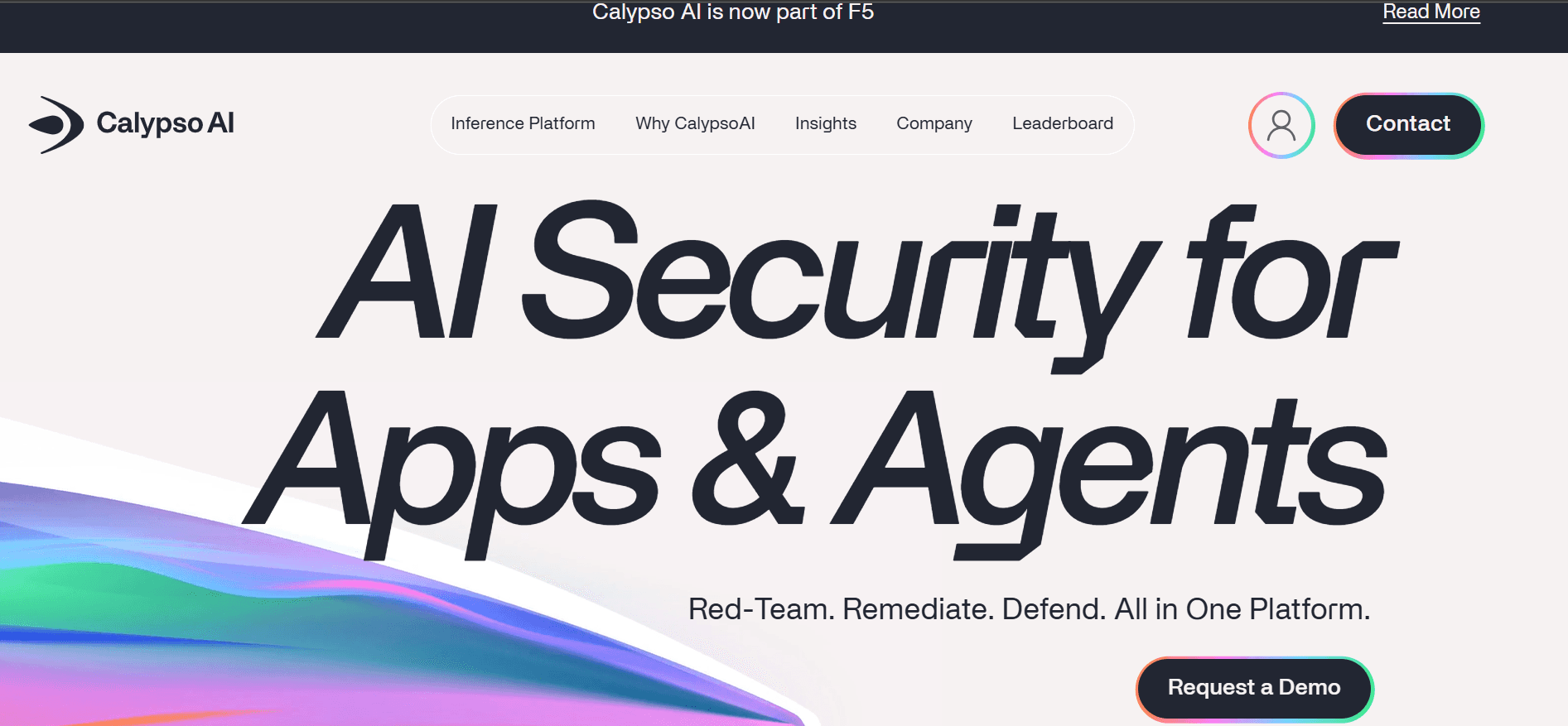
Image Source: Calypso AI
CalypsoAI delivers a comprehensive AI Cybersecurity tool that secures generative AI applications and LLMs at inference time. It uses agentic red-teaming, real-time defense, and continuous observability to protect models, AI agents, and applications against threats such as prompt injection, jailbreaks, data leakage, and other attacks. The platform is model-agnostic and supports any AI systems or LLMs, and can integrate with current enterprise infrastructure (SOAR, SIEM, audit workflows).
Best for: Businesses that are looking to deploy or scale Gen AI across multiple agents, tools, models, or when they need runtime security and compliance controls.
11. Cranium
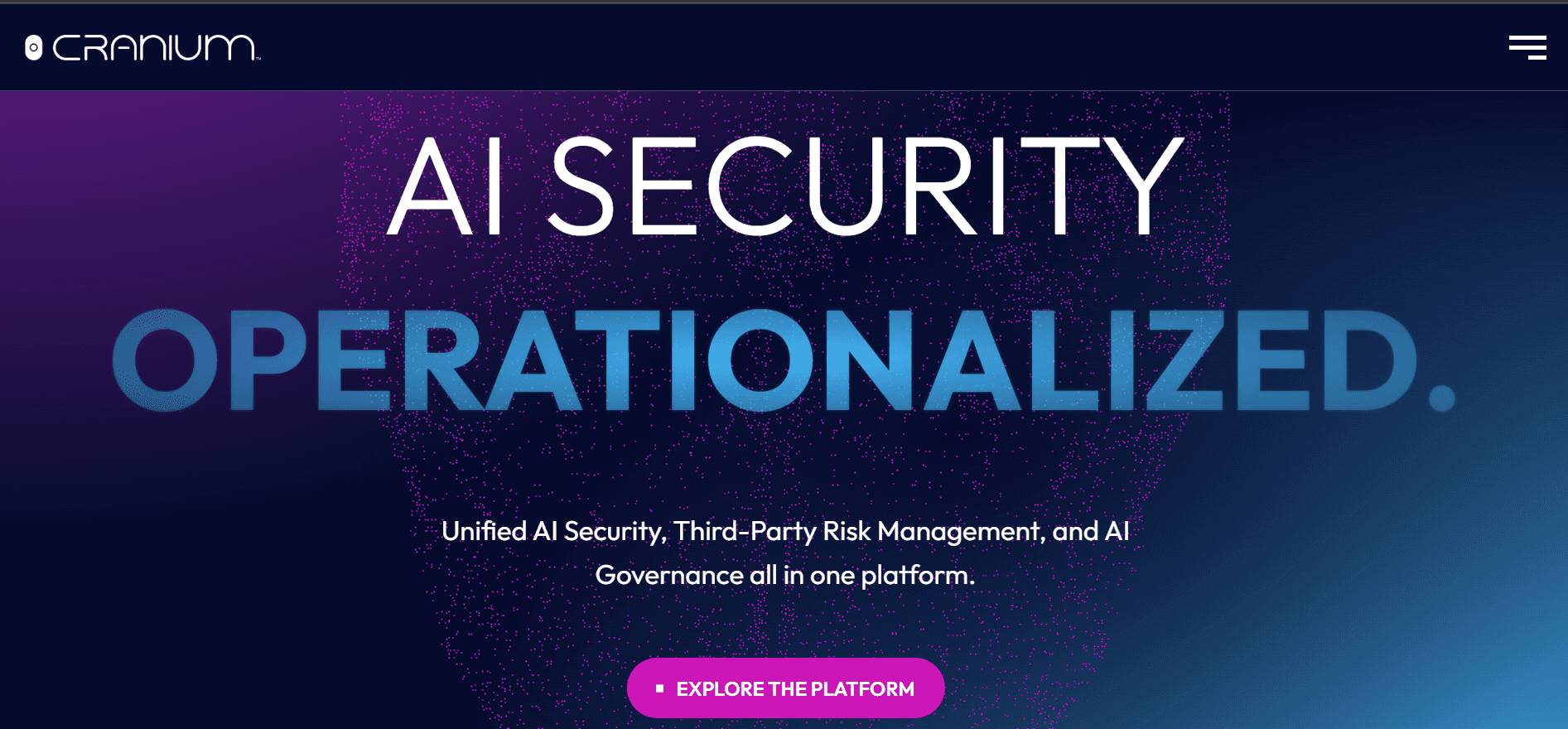
Image Source: Cranium AI
Cranium is an AI governance and security tool which assists enterprises to inventory, test, and secure their AI & ML ecosystems. It discovers models, pipelines, datasets. This tools also supports compliance workflows and third-party risk oversight for businesses that depend on internal and external AI systems.
Best for: Businesses that need complete visibility into their AI assets and security testing across the AI supply chain.
12. Securiti
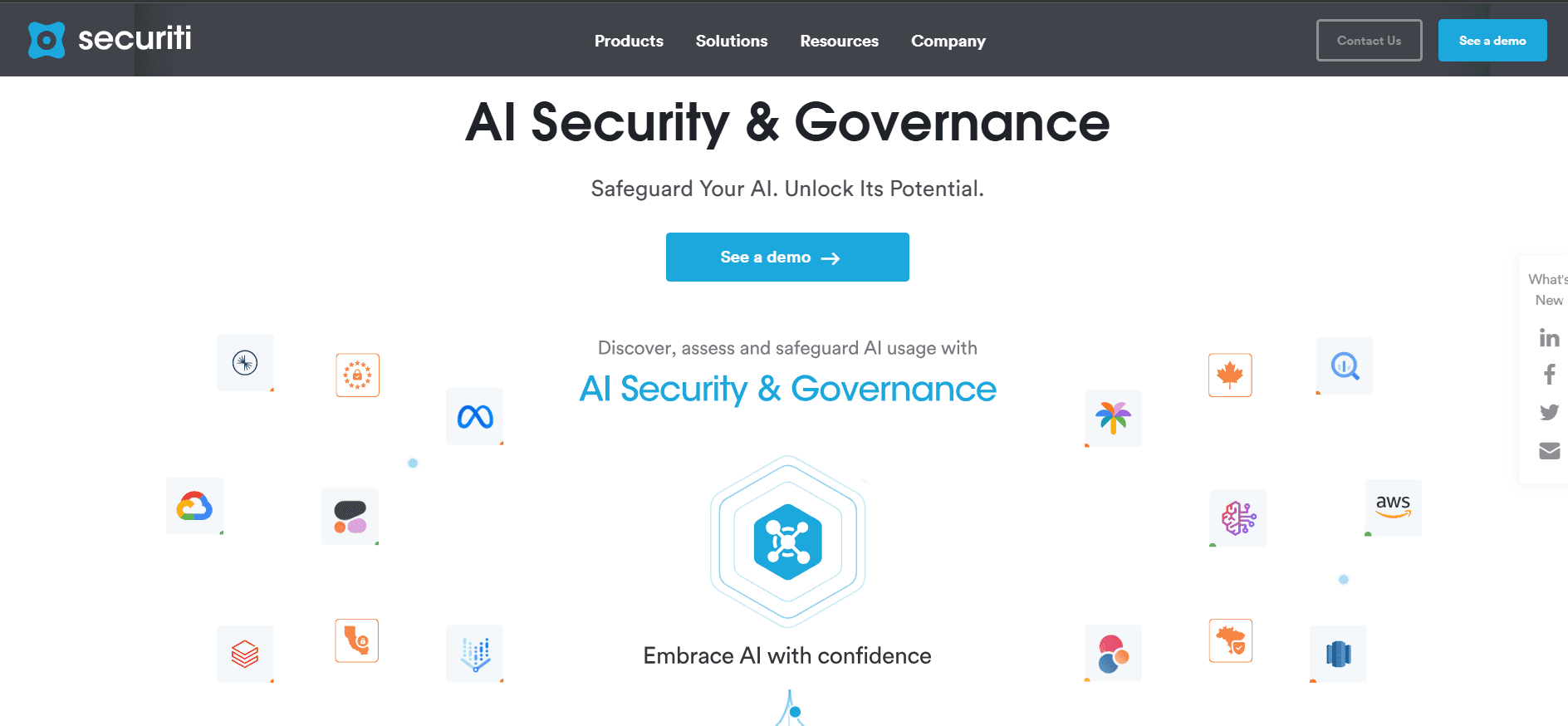
Image Source: Securiti
Securiti is an AI security and Governance tool which harnesses artificial intelligence to discover and categorizes malicious behavior across SaaS environments, public and private clouds. It can automatically discover AI models in public clouds, gather AI model details from SaaS and internal projects. Besides this it also catalogs AI models for full visibility, including shadow AI.
Best for: Businesses looking for comprehensive AI security, governance and compliance across multi cloud, hybrid and SaaS environments.
. Aim Security
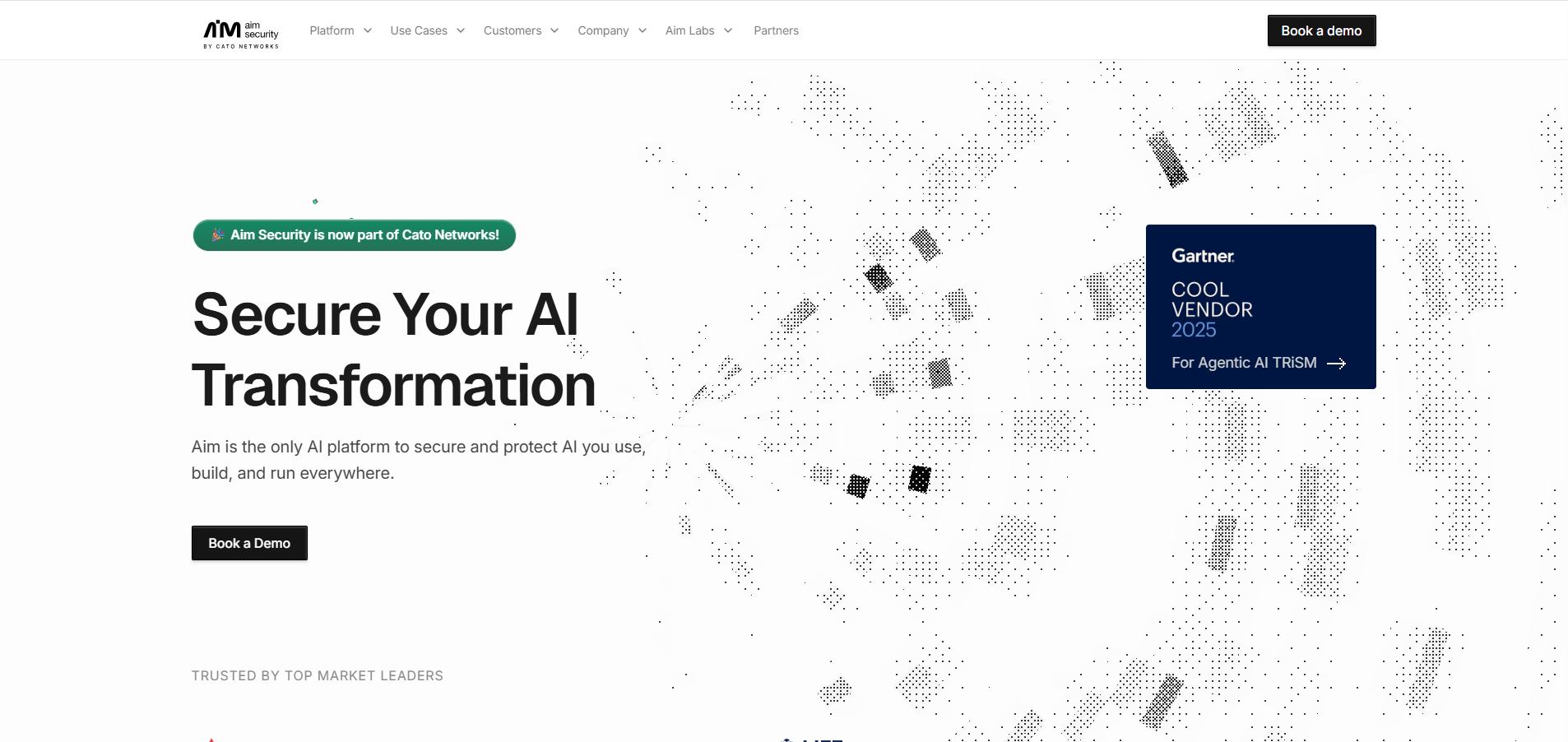
Aim Security offers an enterprise-grade platform designed to protect organizations adopting generative AI at scale. The solution combines real-time AI runtime protection through an AI firewall, comprehensive visibility into AI assets via AI Security Posture Management (AI-SPM), and continuous monitoring to identify risks such as prompt manipulation, sensitive data exposure, and adversarial activity against AI systems. It supports both employee-used third-party AI services and internally developed AI agents and applications.
Best for: Enterprises using public or private generative AI tools, developing custom AI agents, or seeking end-to-end security, governance, and compliance across their AI ecosystem.
14. Big ID
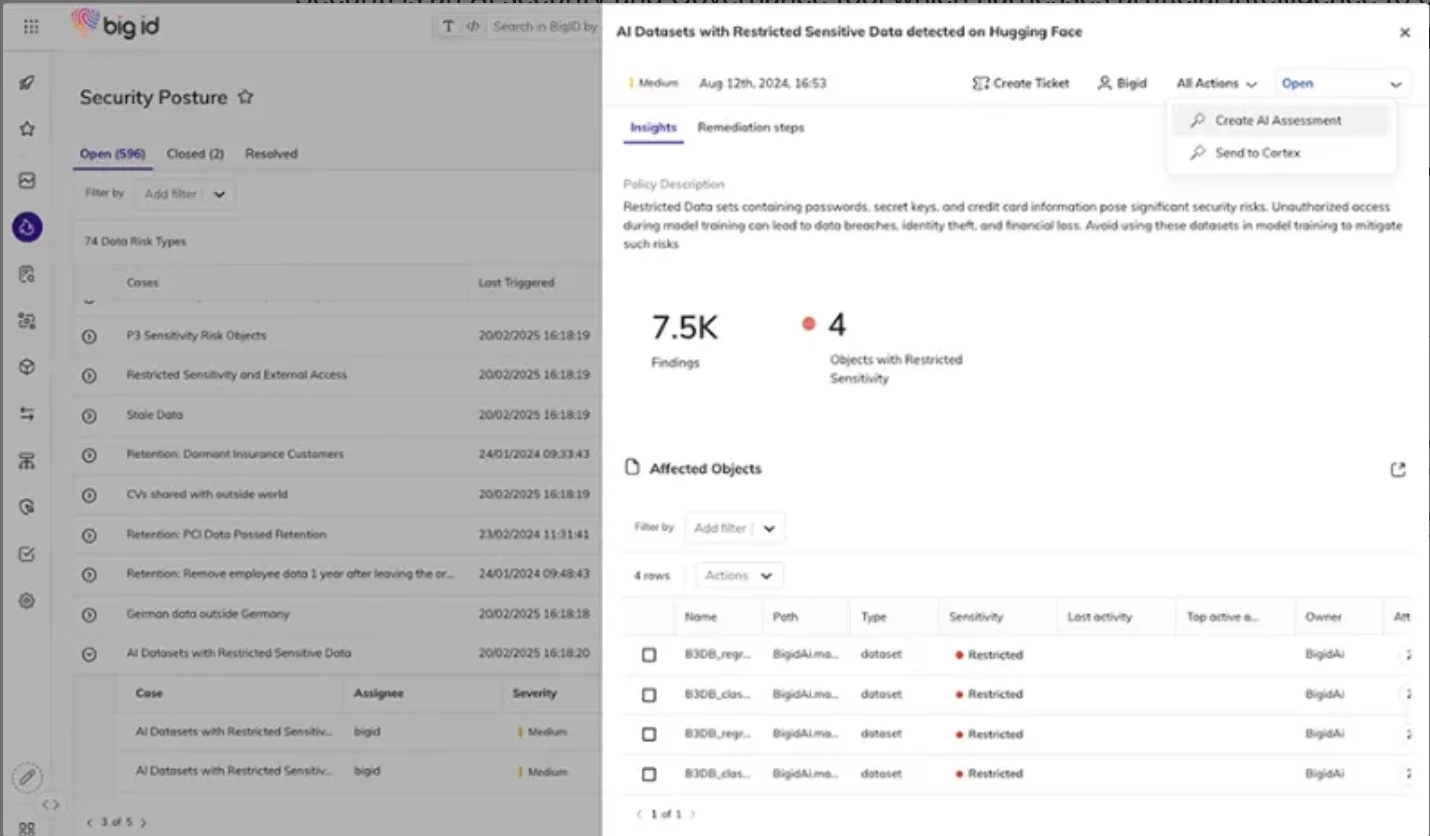
Image Source: Big ID
Big ID is a AI security and Governance tool which uses AI to secure & govern AI data & models across entire enterprise environment. Its AI trust, risk, and security management is specially built for the enterprise with controls. The native mapping and actionability is ideal for the modern AI space.
Best for: Regulated sectors like finance, healthcare, insurance and manufacturing looking to deploy AI and secure data across multiple environments.
15. Obsidian AI
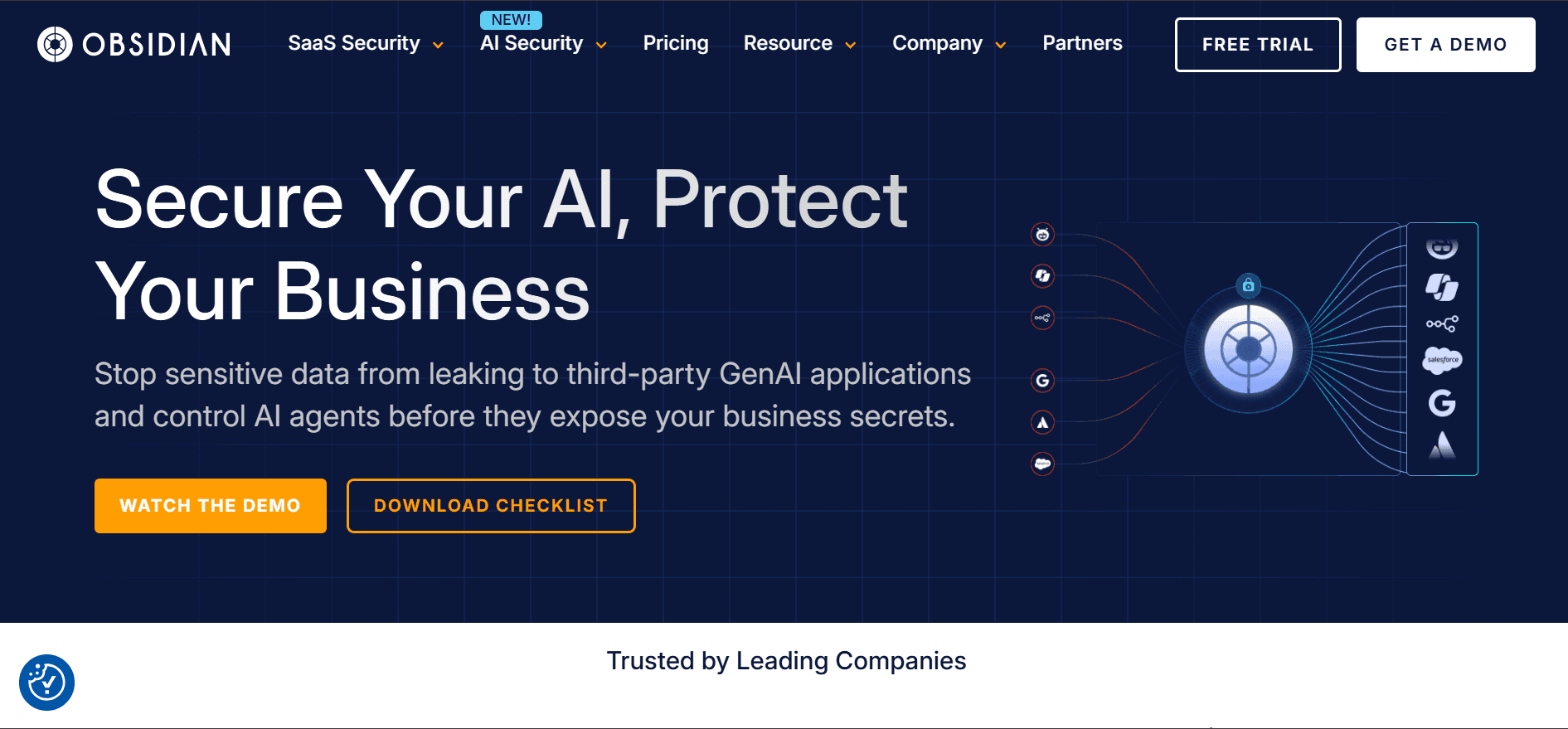
Image Source: Obsidian AI
Obsidian AI is a AI based SaaS security tool designed to secure, monitor and govern SaaS apps, AI agents and third-party integrations. It discovers every GenAI tool and extension in use and implements prompt security policies to prevent data leaks. Maps all active AI platforms and maintain enterprise-grade governance. Besides this it inventories and audits all AI agent with a centralized view of authors, usage, and SaaS connections.
Best for: Enterprises looking to secure SaaS apps and manage AI-based risks.
How to Choose the Right AI Security Tool
There are many top AI-powered security tools to choose from the list above. However, each has its own strengths and weaknesses. The checklist below helps you choose an round security tool best suited for your security team’s use case that can solidify security posture.
Cloud and CI/CD Integration
It should seamlessly with cloud platforms and DevOps pipelines to identify, monitor and remediate AI risks early in the development lifecycle.
Misconfiguration and Vulnerability
Implements secure AI configuration baselines and continuously scans for risks and focuses on fixes based on the impact.
Full Visibility and Shadow AI Detection
It should discover all AI assets like models, SDKs, services and tools to prevent unauthorized and unmanaged usage of AI.
Governance and Compliance
The AI security tool should have the capability to automates compliance checks, secures sensitive information and should provide audit trails for regulations such as GDPR, CCPA and Industry Standards.
Attack Analysis and Proactive Risk Reduction
It must captures and eliminate the attack paths to AI models and data before they can misused which reduces the probability of incident.
Final Thoughts on AI Security Tools
Selecting the right tool requires assessing organizational needs and choosing features that deliver measurable improvements in security operations.
Akto is the trusted AI Agent Security and MCP Security partner for Fortune 500 security teams. With cutting-edge technologies and a proactive approach, Akto empowers organizations to seamlessly protect their critical assets against emerging cyber threats. By leveraging AI-driven insights and advanced security protocols, Akto enhances security posture, accelerates threat detection, and ensures rapid incident response, all while minimizing operational overhead. Trusted by industry leaders, Akto is committed to delivering scalable, efficient, and robust security solutions tailored to meet the complex needs of global enterprises.
Book a demo today to discover Akto's Agentic AI Security and MCP Security
Important Links
Experience enterprise-grade Agentic Security solution
